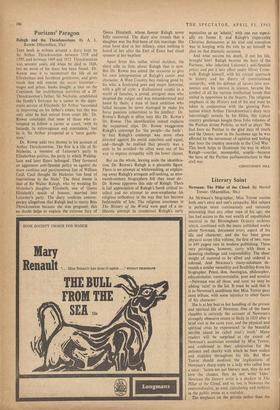Puritans' Paragon
Ralegh and the Throckmortons. By A. L. Rowse. (Macmillan, 35s.)
THIS book is written around a diary kept by Sir Arthur Throckmorton between 1578 and 1595, and between 1609 and 1613. Throckmorton was seventy years old when he died in 1626, but no more of his diary has been found. Dr. Rowse uses it to reconstruct the life of an Elizabethan and Jacobean gentleman, and gives much that will interest the social historian— wages and prices, books bought. a tour on the Continent, the multifarious activities of a JP. rhrockmorton's father, Sir Nicholas, established the family's fortunes by a career in the diplo- matic service of Elizabeth: Sir Arthur 'succeeded in improving on his father's estate, but this was only after he had retired from court life.' Dr. Rowse concludes that most of those who at- tempted to follow a career at court, 'with its hazards, its extravagance and ostentation,' lost by it. Sir Arthur prospered as a 'mere gentle- man.'
Dr. Rowse adds two themes to his account of Arthur Throckmorton. The first is a life of Sir Nicholas, a member of Leicester's party in 'Elizabethan politics, the party to which Walsing- ham and later Essex belonged. They favoured an aggressive anti-Spanish policy as against the more cautious and parsimonious line of William Cecil. Cecil thought Sir Nicholas 'too fond of innovations in the State.' The third theme is that of Sir Walter Ralegh, who by wedding Sir Nicholas's daughter Elizabeth, one of Queen Elizabeth's maids of honour, married into Leicester's party. The diary confirms contem- porary allegations that Ralegh had to marry Bess Throckmorton because she was pregnant; this no doubt helps to explain the extreme fury of Queen Elizabeth, whose favour Ralegh never fully recovered. The diary also reveals that a daughter was the first-born of this marriage. She must have died in her infancy, since nothing is heard of her after the Earl of Essex had stood sponsor at her baptism.
Apart from this rather trivial incident, the diary tells us little about Ralegh that is new. But Dr. Rowse has seized the occasion to give his own interpretation of Ralegh's career and character. A West Country boy making good by his wits; a frustrated poet and major historian, with a gift of style; a disillusioned sceptic in a world of fanatics; a proud, arrogant man who despised the vulgar and was misunderstood and hated by them; a man of hard ambition who failed because he never managed to make his fierce passions subservient to his intellect: Dr. Rowse's Ralegh is often very like Dr. Rowse's Dr. Rowse. This identification indeed explains the occasional slips. Dr. Rowse exaggerates Ralegh's contempt for 'the people—the fools': in fact Ralegh's contempt was more often directed against his social superiors and equal, and—though he realised that poverty was a state to be avoided—he often went out of his way to express sympathy with the lower classes.
But on the whole, leaving aside the identifica- tion, Dr. Rowse's Ralegh is a plausible figure. There is no attempt at whitewashing, at explain- ing away Ralegh's arrogant self-seeking, as nine- teenth-century biographers felt they must do: Dr Rowse approves this side of Ralegh. There is full appreciation of Ralegh's harsh critical in- tellect and no attempt to over-emphasise his religious orthodoxy in the way that has become fashionable of late. The religious overtones in The History of the World were part of a de- liberate attempt to counteract Ralegh's early reputation as an 'atheist,' with one eye especi- ally on James I; and Ralegh's impeccably Christian demeanour at his trial and execution was in keeping with the role he set himself to play on that dramatic occasion.
And what success his death, if not his life, brought him! Ralegh became the hero of the Puritans, who inherited Leicester's anti-Spanish policy and put it into effect under Oliver Crom- well. Ralegh himself, with his critical approach to history and his theory of constitutional monarchy, with his defence of laissez-faire eco- nomics and his interest in science, became the symbol of all the various intellectual trends that united in opposition to the Stuarts. The religious emphasis in the History and of his end must be taken in conjunction with the growing Puri- tanism which Arthur Throckmorton's diary very interestingly reveals. In his fifties, this typical country gentleman bought three folio volumes of the Puritan divine Perkins, as well as plays. 'He had been no Puritan in the glad days of youth and the Queen; now in the Jacobean age he was affected by the movement of opinion and feeling that bore the country onwards to the Civil War.' This book helps to illuminate the way in which Ralegh—courtier, monopolist, sceptic—became the hero of the Puritan parliamentarians in that civil war.
CHRISTOPHER HILL


































 Previous page
Previous page